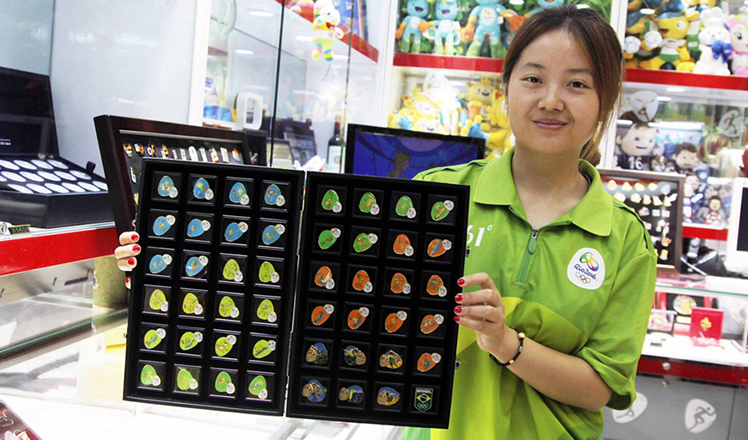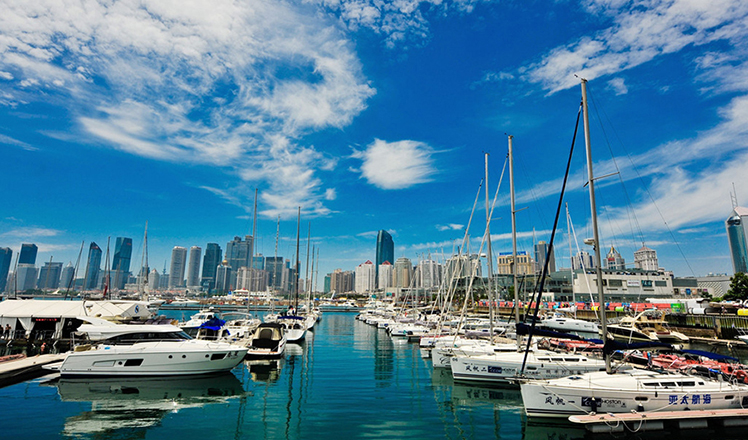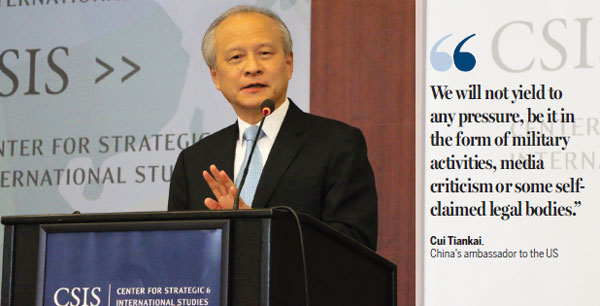China envoy blasts Hague ruling
Updated: 2016-07-13 11:01
By Chen Weihua in Washington(China Daily USA)
|
||||||||
|
Cui Tiankai, Chinese ambassador to the United States, talks about China's stance on the South China Sea issue on Tuesday afternoon at the Center for Strategic and International Studies in Washington after the ruling by the arbitration tribunal at The Hague in a case brought by the Philippines against China regarding the South China Sea dispute. chen weihua / china daily |
Chinese Ambassador to the United States Cui Tiankai said his country will not yield to any pressure or make deals for its core interests.
He made the remarks in a speech in Washington on Tuesday afternoon following the ruling announced in the morning by the Permanent Court of Arbitration in The Hague in a case brought by the Philippines against China regarding disputes in the South China Sea.
"We will not yield to any pressure, be it in the form of military activities, media criticism or some self-claimed legal bodies," Cui said at the Center for Strategic and International Studies at the end of a full-day conference on the South China Sea.
"And we will certainly not make deals with our core interest just for a few words of praise," he added.
His speech came after the Chinese government and the Ministry of Foreign Affairs respectively issued statements on China's territorial sovereignty and maritime rights and interests in the South China Sea and on the award by the arbitration tribunal.
In front of an audience of several hundred people, including many experts on maritime law and international relations, Cui attributed China's rejection of the arbitration to the fact that it violates the general practice that arbitration should be premised on a state's consent.
China, like dozens of other countries, made an optional exceptional declaration in 2006 in accordance with Article 298 of the United Nations Convention on the Law of the Sea (UNCLOS), excluding issues like maritime delimitation for such processes. China has repeatedly stated that the tribunal has no jurisdiction.
"The case was also carefully masked," Cui said. "But it is beyond any doubt that the core issue is a territorial dispute, and territorial issues are not subject to UNCLOS."
He described the tribunal's failure to recognize that as "a matter of professional incompetence," adding that "deliberate disregard is a matter of questionable integrity".
Cui described the case as initiated not out of good faith and said the proceedings will probably do great damage to the efforts by members of the international community to engage in negotiations and consultation for settlement of any possible disputes.
"Such absurd proceedings were taking place in combination with military coercion - with mounting activities by destroyers, aircraft carriers, strategic bombers, reconnaissance planes and many others," he said, clearly referring to the escalating US military presence and activities in the South China Sea.
"I believe this is an outright manifestation of 'might is right'," he said.
Cui said tensions began to rise in the South China Sea about five or six years ago, the same time people heard about the pivot to Asia. He said disputes have intensified, relations strained and confidence weakened in the last few years.
"These issues have taken so much time and energy at so many regional and international forums, time that should have been spent to promote cooperation," he said.
The Chinese ambassador warned that if the Asia-Pacific is destabilized, regional economic growth momentum weakened and armed conflict starts, everyone's interests will be hurt.
He repudiated the blame on China's land reclamation, saying China is the last country to do so and does so only on the islands and reefs under its own control, rather than trying to take back the islands and reefs illegally occupied by others.
Cui emphasized that negotiation and consultation among parties concerned still offer the most feasible and effective way forward. He said diplomatic efforts should not and will not be blocked by "a scrap of paper or by a fleet of aircraft carriers."
He cited the example of China's good track record of solving land border disputes with 12 of its 14 neighbors and also the agreement with Vietnam on maritime delimitation.
"So we are confident that China and other parties concerned, if not disturbed, will be able to resolve boundary issues over time through negotiations and consultations," he said.
Cui reiterated that the territorial issues in the South China Sea should not be an issue between China and the US or seen as part of a strategic rivalry between the two countries.
chenweihua@chinadailyusa.com
- Arbitration body 'has nothing to do' with us, says UN
- Trump expected to make VP announcement on Friday
- 25 killed, 50 injured as trains collide in Italy
- The South China Sea Arbitration: Illegal, Illegitimate and Invalid
- Theresa May set to be UK's next Prime Minister after rival stands down
- Killing of UN Chinese peacekeepers slamed

 Coming-of-Age Day on the frontline of fighting floods
Coming-of-Age Day on the frontline of fighting floods
 Monks seek tranquility inside lotus ponds
Monks seek tranquility inside lotus ponds
 In pics: Top 10 livable Chinese cities
In pics: Top 10 livable Chinese cities
 Restaurant of 'bandits' opens in Northeast China's Jilin
Restaurant of 'bandits' opens in Northeast China's Jilin
 Ivanovic, Schweinsteiger holds wedding in Venice
Ivanovic, Schweinsteiger holds wedding in Venice
 Tim Duncan announces retirement after 19 seasons with Spurs
Tim Duncan announces retirement after 19 seasons with Spurs
 Merchandize for Rio 2016 a hit in run-up to games
Merchandize for Rio 2016 a hit in run-up to games
 Top 10 best Chinese cities to own a house
Top 10 best Chinese cities to own a house
Most Viewed
Editor's Picks

|

|

|

|

|

|
Today's Top News
Ministry slams US-Korean THAAD deployment
Two police officers shot at protest in Dallas
Abe's blame game reveals his policies failing to get results
Ending wildlife trafficking must be policy priority in Asia
Effects of supply-side reform take time to be seen
Chinese State Councilor Yang Jiechi to meet Kerry
Chinese stocks surge on back of MSCI rumors
Liang avoids jail in shooting death
US Weekly

|

|








